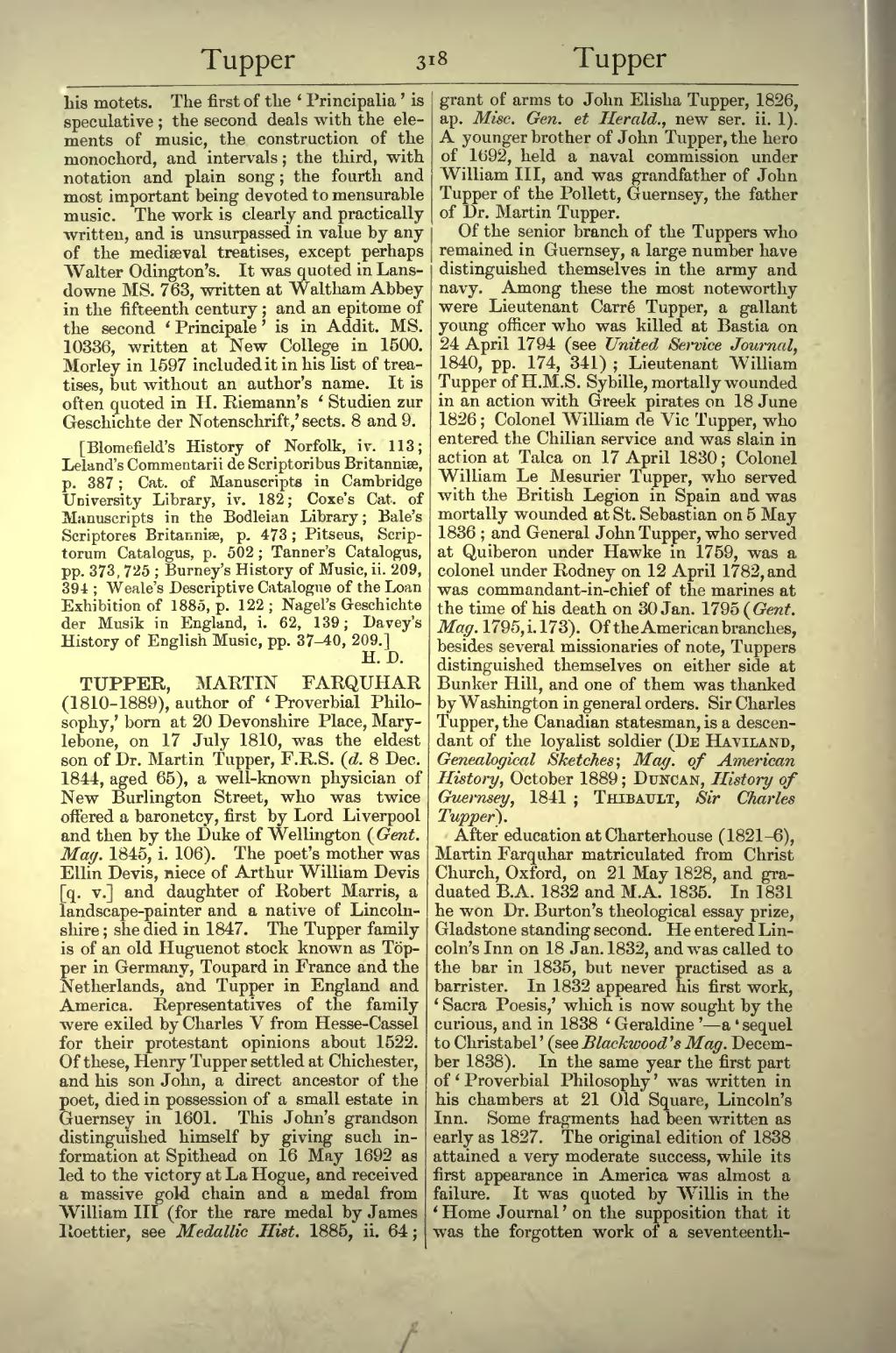his motets. The first of the ‘Principalia’ is speculative; the second deals with the elements of music, the construction of the monochord, and intervals; the third, with notation and plain song; the fourth and most important being devoted to mensurable music. The work is clearly and practically written, and is unsurpassed in value by any of the mediæval treatises, except perhaps Walter Odington's. It was quoted in Lansdowne MS. 763, written at Waltham Abbey in the fifteenth century; and an epitome of the second ‘Principale’ is in Addit. MS. 10336, written at New College in 1500. Morley in 1597 included it in his list of treatises, but without an author's name. It is often quoted in H. Riemann's ‘Studien zur Geschichte der Notenschrift,’ sects. 8 and 9.
[Blomefield's History of Norfolk, iv. 113; Leland's Commentarii de Scriptoribus Britanniæ, p. 387; Cat. of Manuscripts in Cambridge University Library, iv. 182; Coxe's Cat. of Manuscripts in the Bodleian Library; Bale's Scriptores Britanniæ, p. 473; Pitseus, Scriptorum Catalogus, p. 502; Tanner's Catalogus, pp. 373, 725; Burney's History of Music, ii. 209, 394; Weale's Descriptive Catalogue of the Loan Exhibition of 1885, p. 122; Nagel's Geschichte der Musik in England, i. 62, 139; Davey's History of English Music, pp. 37–40, 209.]
TUPPER, MARTIN FARQUHAR (1810–1889), author of ‘Proverbial Philosophy,’ born at 20 Devonshire Place, Marylebone, on 17 July 1810, was the eldest son of Dr. Martin Tupper, F.R.S. (d. 8 Dec. 1844, aged 65), a well-known physician of New Burlington Street, who was twice offered a baronetcy, first by Lord Liverpool and then by the Duke of Wellington (Gent. Mag. 1845, i. 106). The poet's mother was Ellin Devis, niece of Arthur William Devis [q. v.] and daughter of Robert Marris, a landscape-painter and a native of Lincolnshire; she died in 1847. The Tupper family is of an old Huguenot stock known as Töpper in Germany, Toupard in France and the Netherlands, and Tupper in England and America. Representatives of the family were exiled by Charles V from Hesse-Cassel for their protestant opinions about 1522. Of these, Henry Tupper settled at Chichester, and his son John, a direct ancestor of the poet, died in possession of a small estate in Guernsey in 1601. This John's grandson distinguished himself by giving such information at Spithead on 16 May 1692 as led to the victory at La Hogue, and received a massive gold chain and a medal from William III (for the rare medal by James Roettier, see Medallic Hist. 1885, ii. 64; grant of arms to John Elisha Tupper, 1826, ap. Misc. Gen. et Herald., new ser. ii. 1). A younger brother of John Tupper, the hero of 1692, held a naval commission under William III, and was grandfather of John Tupper of the Pollett, Guernsey, the father of Dr. Martin Tupper.
Of the senior branch of the Tuppers who remained in Guernsey, a large number have distinguished themselves in the army and navy. Among these the most noteworthy were Lieutenant Carré Tupper, a gallant young officer who was killed at Bastia on 24 April 1794 (see United Service Journal, 1840, pp. 174, 341); Lieutenant William Tupper of H.M.S. Sybille, mortally wounded in an action with Greek pirates on 18 June 1826; Colonel William de Vic Tupper, who entered the Chilian service and was slain in action at Talca on 17 April 1830; Colonel William Le Mesurier Tupper, who served with the British Legion in Spain and was mortally wounded at St. Sebastian on 5 May 1836; and General John Tupper, who served at Quiberon under Hawke in 1759, was a colonel under Rodney on 12 April 1782, and was commandant-in-chief of the marines at the time of his death on 30 Jan. 1795 (Gent. Mag. 1795, i. 173). Of the American branches, besides several missionaries of note, Tuppers distinguished themselves on either side at Bunker Hill, and one of them was thanked by Washington in general orders. Sir Charles Tupper, the Canadian statesman, is a descendant of the loyalist soldier (De Haviland, Genealogical Sketches; Mag. of American History, October 1889; Duncan, History of Guernsey, 1841; Thibault, Sir Charles Tupper).
After education at Charterhouse (1821–6), Martin Farquhar matriculated from Christ Church, Oxford, on 21 May 1828, and graduated B.A. 1832 and M.A. 1835. In 1831 he won Dr. Burton's theological essay prize, Gladstone standing second. He entered Lincoln's Inn on 18 Jan. 1832, and was called to the bar in 1835, but never practised as a barrister. In 1832 appeared his first work, ‘Sacra Poesis,’ which is now sought by the curious, and in 1838 ‘Geraldine’—a ‘sequel to Christabel’ (see Blackwood's Mag. December 1838). In the same year the first part of ‘Proverbial Philosophy’ was written in his chambers at 21 Old Square, Lincoln's Inn. Some fragments had been written as early as 1827. The original edition of 1838 attained a very moderate success, while its first appearance in America was almost a failure. It was quoted by Willis in the ‘Home Journal’ on the supposition that it was the forgotten work of a seventeenth-
